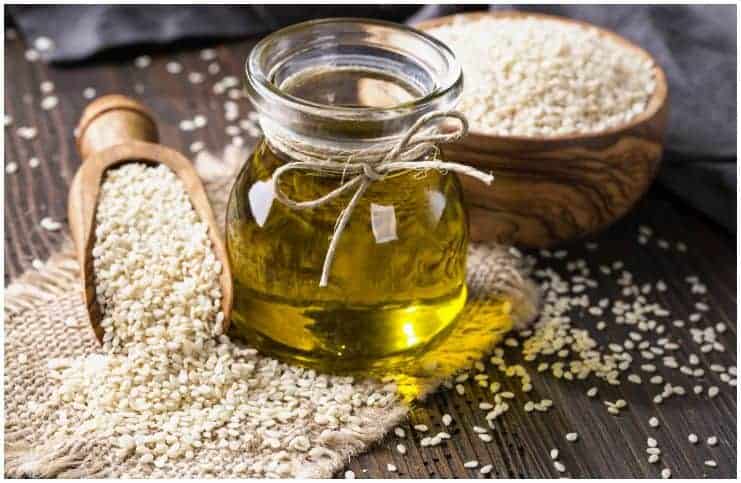What are the benefits and possible side effects of eating sesame seeds in pregnancy?
Introduction
Sesame seeds are derived from a plant of the Sesamum genus and bear the botanical name of Sesamum indicum.
Some records show that sesame was traded in parts of the Indian sub-continent and Mesopotamia around 2000 B.C.
Also, soldiers often ate the mixture for energy and strength, while in ancient Babylonian times, women believed that mixing sesame seeds with raw honey would promote longevity and youth.
Sesame seeds were brought to the US from Africa during the late 17th century. In the present day, the largest commercial producers of sesame seeds include China, India, and Mexico.
Nutrition Facts
Two tbs of sesame seeds have about 100 calories. They also contain protein, dietary fiber, unsaturated fat, carbohydrates, calcium, zinc, potassium, iron, phosphorus, magnesium, folate, vitamin B6, copper, manganese, selenium, vitamins E, pantothenic acid, and thiamin. In addition, these seeds contain the highest amount of oil out of any other seeds.
Health Benefits
Bone Health
1 tbs of whole sesame seeds contain about 87mg (9 percent of the recommended daily intake) of calcium, the most present mineral in the human body, that is stored in the body mostly in the teeth and bones. Consuming enough calcium is a must for optimal nutrition and health.
Reduced Blood Pressure
According to a recent study, these seeds lower blood pressure in people with type 2 diabetes mellitus since they are full of magnesium (1 tbs has 8 percent of the daily recommended intake), an essential nutrient known to help lower blood pressure.
Constipation Relief
100g of these seeds will provide about 47 percent of the required dietary fiber. Fiber plays an important role in your heart, digestive, and skin health, and may improve weight management, blood sugar (glucose) control, gut health, and more.
Diabetes
They contain magnesium and potassium (100g contains 13 percent of the daily recommended intake), two minerals that have been shown to prevent type 2 diabetes. They can also improve plasma glucose (sugar) in hypersensitive diabetics.
Vitamin E
Vitamin E is important for the maintenance and growth of glowing hair, skin, and nails. Consuming vitamin E also reduces the risk of developing preventable diseases (hardening of the arteries, heart disease, or stroke) because it acts as an antioxidant in the human body.
Metabolic Function
These seeds are high in protein (100g contains 35 percent of the daily recommended intake), a nutrient crucial for numerous biological processes to keep the body running smoothly, like – mobility, cellular growth, strength, and energy.
Skin Health Improvement
The oil present in these seeds can do wonders for the skin. They have anti-inflammatory properties which are important for healing sores, redness, and other facial skin problems from within. Also, they help the skin remain supple and soft.
Iron-Anemia Prevention
Sesame seeds are powerhouses of iron (100g contains 81 percent of the daily recommended intake of iron). That is the main reason why they are one of the most recommended natural remedies for iron anemia and other iron-deficient problems.
Respiratory Health
The magnesium contained in these amazing seeds wards off asthma and other respiratory problems by preventing airway spasms (a constriction of the muscles in the walls of the bronchioles).
Fighting Against Oxidative Stress
Sesame seeds reduce markers of oxidative stress among individuals with diabetes, high blood pressure, and high LDL and total cholesterol, according to a 2016 study that was published in the Journal of Medicinal Food.
Cancer Prevention
They contain “phytate,” which is one of the most potent natural anti-cancer substances and one of the most potent antioxidants. Phytate also helps inhibit the growth of different types of cancer cells.
Rheumatoid Arthritis
They contain copper, an essential trace mineral that is important for antioxidant enzyme systems, hence, reducing pain and swelling associated with rheumatoid arthritis. Additionally, copper provides strength to the bones, blood vessels, and joints.
Will Sesame Seeds Cause Abortion?
Due to a common belief that this seed is a heat-emitting food (according to Ayurveda), many women assume that eating sesame seeds will increase their body’s heat and upset the balance within, leading to premature labor or even miscarriage.
However, there is no sufficient evidence to prove this belief. Therefore, eating these seeds during pregnancy will not cause miscarriage.
Bottom Line – Is It Safe To Eat Sesame Seeds In Pregnancy?
Yes. There is no scientific proof to suggest that sesame seeds are unsafe during pregnancy. On the contrary, they are loaded with important nutrients, fats, and protein. They are also a superfood for a healthy pregnancy.
If you are planning to include sesame seeds in your regular diet, here are some simple methods to incorporate them:
- like hemp milk, almond milk, or hazelnut milk, you can make your own sesame milk;
- sesame oil is an excellent option to try to incorporate into your cooking;
- add raw sesame seeds to any side dish for extra crunch and flavor – best option;
- they can also be roasted, crushed, and then sprinkled over salads;
- tahini, one of the ingredients of hummus, is made from vegetable oil and roasted sesame seeds ground into a thin paste.
Tip
Roasting or toasting sesame seeds alters their nutritional value. According to research, the calcium levels are substantially higher when sesame seeds are toasted.
Image credit – Shutterstock
READ THIS NEXT: Broccoli vs Spinach
References https://www.ncbi.nlm.nih.gov/pubmed/25871017 https://www.ncbi.nlm.nih.gov/pubmed/27074618 https://www.ncbi.nlm.nih.gov/pmc/articles/PMC4122033/
